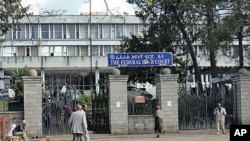Ethiopia has formally charged 24 people, including senior opposition politicians and an outspoken Internet journalist, with plotting terrorist acts to create public chaos. Eight of the defendants appeared in court to hear the charges, while the others are to be tried in absentia.
Two leaders of Ethiopia's Unity for Democracy and Justice Party, Andualem Arage and Natnael Mekonnen, stood alongside columnist Eskinder Nega in federal court Thursday to hear the charges against them. Most of the six charges involve alleged violations of an anti-terrorism law that has come in for harsh criticism from human rights and press freedom groups.
The trio were among the opposition figures arrested in police sweeps in September. They have since been held without bail. Former Ethiopian president Negaso Gidada, who attended the proceedings, told VOA by telephone that Natnael told the court he had been abused repeatedly in custody.
"Natnael complained that for 23 days he was beaten, his clothes were taken, he was left naked, water dumped on him and he was not allowed to sleep, and he had been physically and [psychologically] abused," said Negaso.
Five other defendants also were in the courtroom to hear the charges, but observers attending the proceeding said it was not immediately clear who the others were. Sixteen more were charged in absentia, many of them believed to be living in exile in Europe and North America.
Prominent among the absent defendants was Berhanu Nega. Berhanu was elected mayor of Addis Ababa in 2005, but did not take office and was jailed as part of the government's crackdown on post-election demonstrations. He later fled to the United States, where he heads Ginbot 7, a group dedicated to overthrowing Prime Minister Meles Zenawi's government.
Ginbot 7 is named for the Ethiopian calendar date of the disputed 2005 election. The group is outlawed under the anti-terrorism legislation.
Berhanu was convicted in another terrorism case last year, and received a death sentence in absentia.
Natnael and Andualem had been considered rising stars in Ethiopia's weak political opposition. The opposition won only one seat in the 547-seat parliament last year, making Ethiopia a de facto one-party state.
In a country dominated by state-run media, Eskinder Nega had been one of the few outspoken policy critics of Prime Minister Meles and the ruling Ethiopian People's Revolutionary Democratic Front. He and his newspaper publisher wife were among those jailed following the 2005 election.
After they were freed, the government denied them publishing licenses, but Eskinder continued to contribute his scathing criticisms of government policy, mostly to foreign-based opposition websites.
Prime Minister Meles told a nationally-televised session of parliament last month the government has concrete evidence of journalists' involvement in terrorist activities. He said many reporters working in the country are operating as "messenger boys" for terrorist groups.
The Committee to Protect Journalists [CPJ] lists Ethiopia and neighboring Eritrea as among the foremost jailers of journalists. CPJ research shows eight reporters currently are imprisoned in Ethiopia.
Ethiopia Charges Opposition Figures, Reporter With Terrorism




